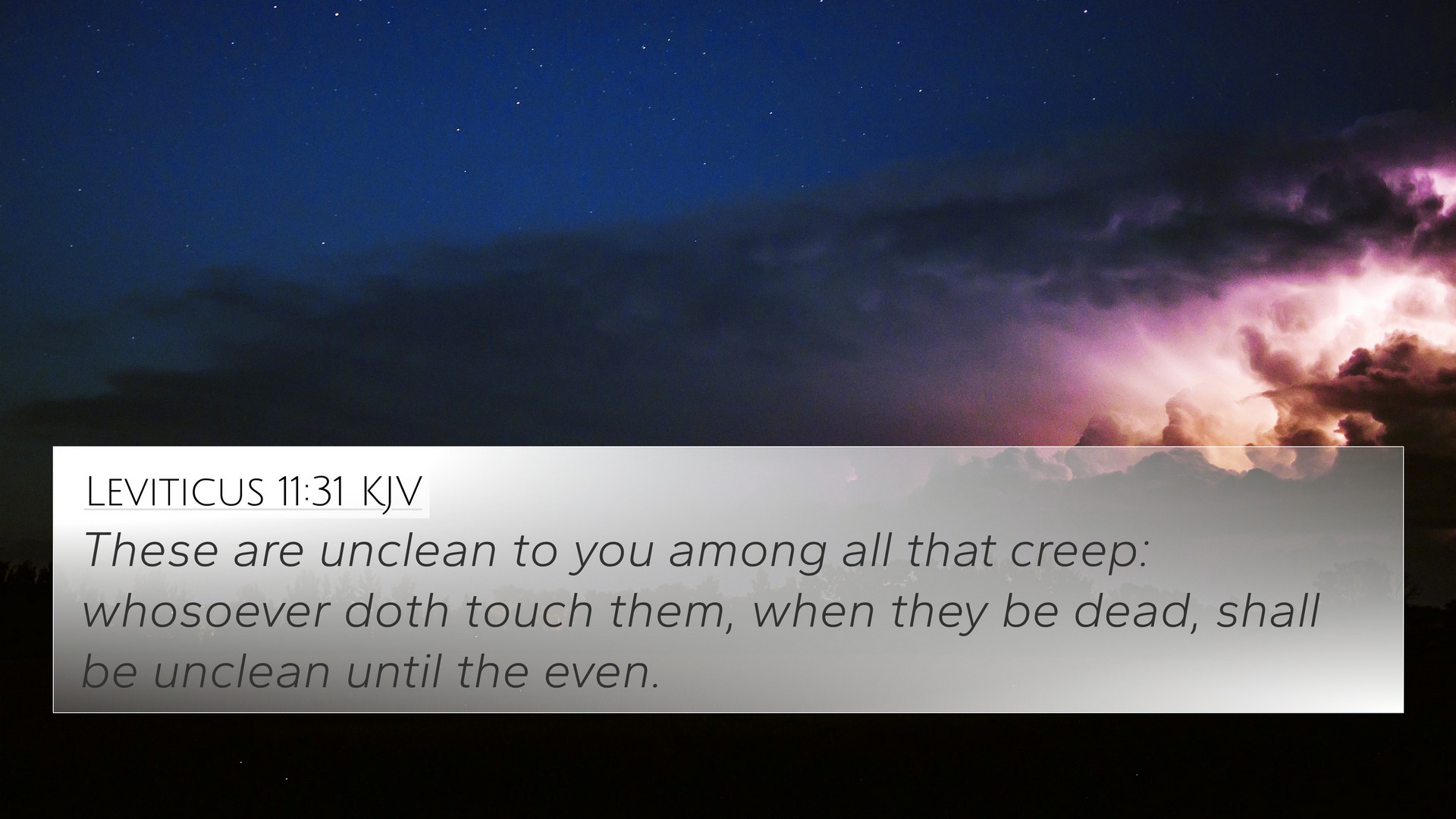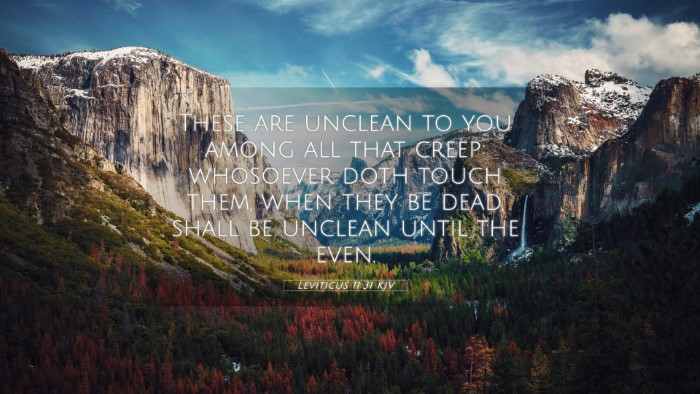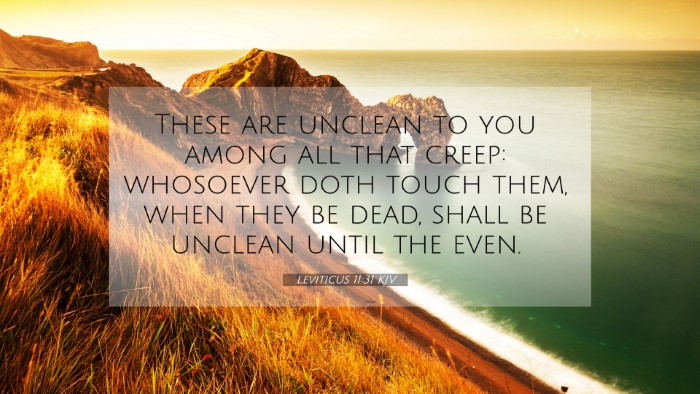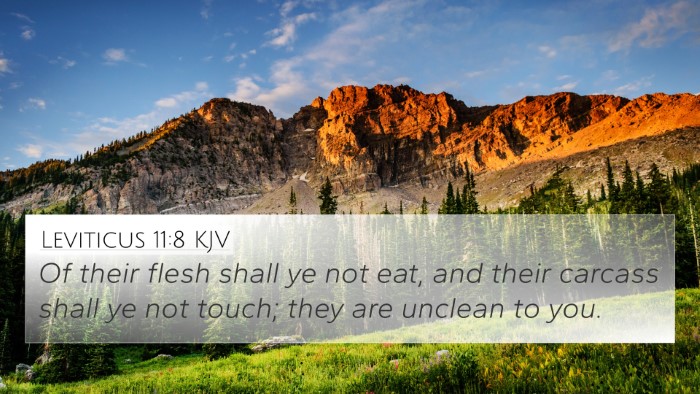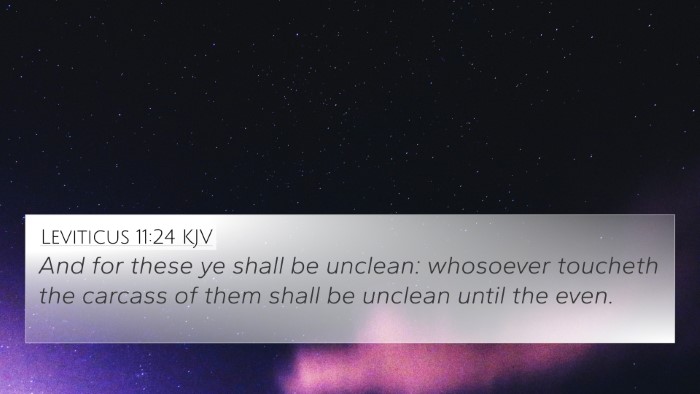Understanding Leviticus 11:31
Leviticus 11:31 states:
"These are unclean to you among all that creep: whosoever touches them, when they be dead, shall be unclean until the even."
Overview
This verse is part of the larger context of dietary laws prescribed in the Book of Leviticus, which speaks to God's instructions for the Israelites regarding cleanliness and what can be consumed.
Commentary Insights
Insights from Matthew Henry
Matthew Henry explains that this verse emphasizes the importance of ritual purity among the chosen people. The directive regarding creatures that crawl signifies a broader principle of separation, meant to delineate between the holy and the unholy.
Insights from Albert Barnes
Albert Barnes provides insight into how the creatures labeled 'unclean' serve as a reminder to the Israelites of their covenant with God. This practice of avoiding contact with unclean animals can be interpreted as a symbolic barrier that helps maintain a distinct identity as God's people.
Insights from Adam Clarke
Adam Clarke further elaborates on the practical aspects of cleanliness outlined in Leviticus. He suggests that the laws given to Israel were not arbitrary; rather, they were intended to promote health and social order, alongside their spiritual significance.
Thematic Connections
This verse invites various themes such as:
- Ritual Purity: The notion of cleanliness extends beyond dietary rules; it reflects a spiritual condition required to approach God.
- Covenant Identity: Unclean laws define the lifestyle of the Israelites as distinct from surrounding nations.
- Health and Safety: Many dietary restrictions are rooted in health considerations, promoting the well-being of the community.
Cross-References
Leviticus 11:31 can be connected to several other Bible verses that explore similar themes of cleanliness, dietary laws, and holiness. Here are some key cross-references:
- Leviticus 10:10: "And that you may put difference between holy and unholy, and between unclean and clean."
- Numbers 19:11: "He that toucheth the dead body of any man shall be unclean seven days."
- Deuteronomy 14:3: "Thou shalt not eat any abominable thing."
- Isaiah 66:17: "They that sanctify themselves, and purify themselves in the gardens behind one tree in the midst, eating swine's flesh, and the abomination, and the mouse, shall be consumed together, saith the LORD."
- Mark 7:15: “There is nothing from without a man, that entering into him can defile him: but the things which come out of him, those are they that defile the man.”
- Romans 14:14: "I know, and am persuaded by the Lord Jesus, that there is nothing unclean of itself: but to him that esteemeth any thing to be unclean, to him it is unclean."
- 1 Peter 1:16: "Because it is written, Be ye holy; for I am holy."
Applications and Reflections
The implications of Leviticus 11:31 extend into modern faith practices. Reflecting on purity, believers today are called to evaluate their own lives in light of God’s standards:
- Spiritual Cleanliness: Like the Israelites, Christians are encouraged to pursue holiness in conduct and thought.
- Understanding Boundaries: Recognizing the barriers God sets in Scripture can help believers maintain distinctiveness in a secular world.
- Holistic Health: Just as God cared for the physical well-being of his people, there is an understanding within the faith community about holistic health.
Conclusion
In summary, Leviticus 11:31 serves as a potent reminder of the overall themes of cleanliness and holiness interwoven throughout Scripture. The insights from revered commentaries, alongside the cross-referenced verses, create a tapestry of meaning that continues to challenge and inspire believers. For those engaging in cross-referencing Bible studies, this verse is a vital component of understanding God’s call to a peculiar and holy people.
